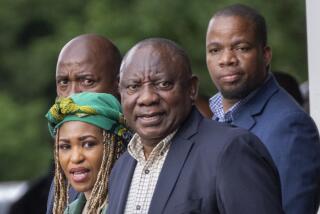Former President’s Book Revisits Apartheid Years
- Share via
JOHANNESBURG, South Africa — Since his retirement as opposition leader in 1997, former South African President Frederik W. de Klerk’s love life has attracted more attention in South Africa than his substantial political legacy.
Last year, De Klerk, the country’s last white head of state, divorced his wife of 39 years and married the glamorous ex-wife of a Greek shipping magnate. The messy affair--with De Klerk’s first wife, Marike, fighting to keep her husband until the bitter end--was splashed across the front pages and evening newscasts.
Now the man who shared the Nobel Peace Prize in 1993 with Nelson Mandela is changing all that. In launching his 398-page autobiography, “The Last Trek: A New Beginning,” De Klerk is reentering South Africa’s ever-tumultuous political scene--and is immediately stirring things up by casting himself in the role of misunderstood hero.
“I am convinced all important decisions the National Party took since 1989 were in the best interest of all South Africans,” De Klerk said. “Despite all of its shortcomings, the new South Africa is infinitely better than it would have been if we had not embarked on the course of fundamental reform nine years ago.”
Many conservative whites, unhappy with black-majority rule, regard De Klerk as a turncoat for giving up more than three centuries of white supremacy with the stroke of a pen. Other whites, who acknowledge the evils of the apartheid system of racial separation, criticize him for not cutting a better deal for minority populations in the new South Africa.
Blacks, including current President Mandela, view De Klerk with great suspicion, particularly because he says he knew nothing about the death squads, assassinations and police-organized torture that continued well into his presidency. When the country’s truth commission, which looked into apartheid-era crimes, recently included a section on De Klerk in its report, he went to court and had the paragraphs blacked out.
“He is trying to explain his presidency and put his spin on particular events that were quite controversial,” said John Kane-Berman, chief executive of the South African Institute of Race Relations.
The institute, which was a bitter critic of the regime that De Klerk took over in 1989, is among the organizations that have invited him to set the record straight. Not coincidentally, De Klerk’s book launch and public speaking blitz come on the anniversary of his famous February 1990 address to Parliament, in which he announced Mandela’s release from prison and the dismantling of the pillars of apartheid.
“Inevitably on such anniversaries, there is a tendency to be retrospective, and in doing so one could easily become involved in a sterile process of self-justification,” De Klerk said. “I wish to avoid this. But I also believe that I owe it to the national debate to provide my perspective on some key aspects of my presidency.”
He insists, despite widespread suspicions to the contrary, that state-perpetrated violence against Mandela’s African National Congress in the early 1990s was carried out without his knowledge and against his orders. He also says the Afrikaner leadership of the National Party, which governed during apartheid, had some “worthy motivations” for its racist policies, including protecting blacks from “Western materialistic culture” and powerful technological forces that would threaten their traditions.
The book is littered with complaints about run-ins with Mandela and perceived personal slights by the former ANC leader. He dedicates nearly a page to a tussle with Mandela over where the De Klerks would live after the National Party lost the 1994 elections. De Klerk stayed on as deputy president, a post he held for two years.
In his speeches, De Klerk says he hopes that his book and public engagements will end “the demonization of the majority of white South Africans” by making clear the important role that whites, including himself, played in undoing racial segregation.
“I don’t deny that our policies, in the end, led to a morally unjustifiable situation which has brought pain to many people,” he said. “But that fact cannot rob us of the claim . . . that we took the initiative to change direction, to dismantle the edifice of apartheid that we constructed.”
More to Read
Sign up for our Book Club newsletter
Get the latest news, events and more from the Los Angeles Times Book Club, and help us get L.A. reading and talking.
You may occasionally receive promotional content from the Los Angeles Times.










